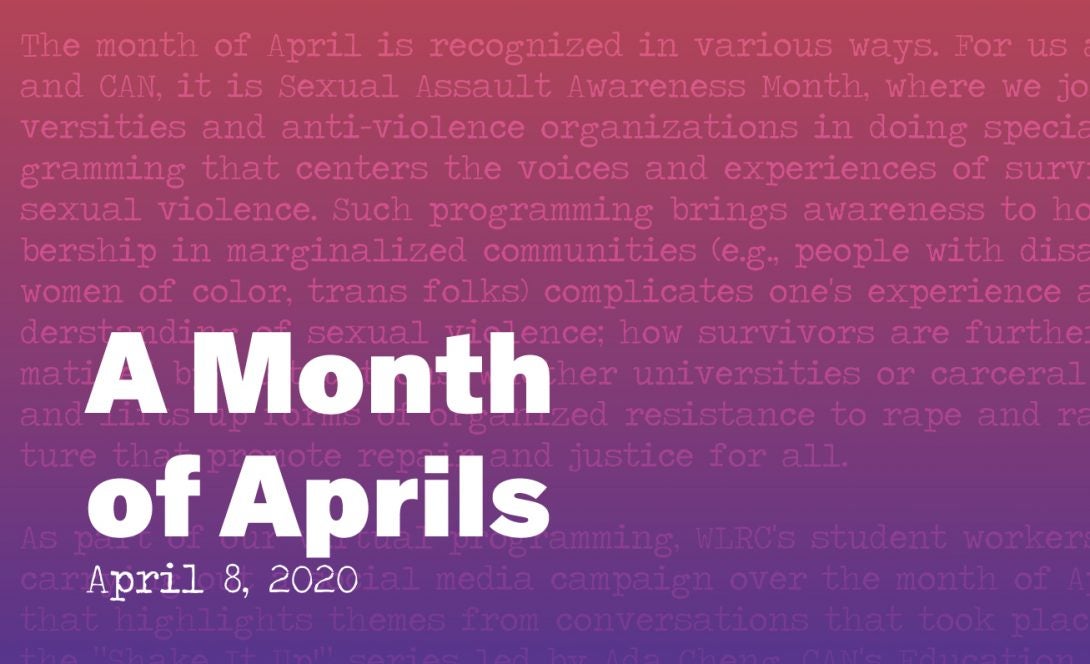A Month of Aprils
A Month of Aprils

April 8, 2020
The month of April is recognized in various ways. For us at WLRC and CAN, it is Sexual Assault Awareness Month, where we join universities and anti-violence organizations in doing special programming that centers the voices and experiences of survivors of sexual violence. Such programming brings awareness to how membership in marginalized communities (e.g., people with disabilities, women of color, trans folks) complicates one’s experience and understanding of sexual violence; how survivors are further traumatized by institutions, whether universities or carceral systems; and lifts up forms of organized resistance to rape and rape culture that promote repair and justice for all.
As part of our virtual programming, WLRC’s student workers will be carrying out a social media campaign over the month of April that highlights themes from conversations that took place during the “Shake It Up!” series led by Ada Cheng, CAN’s Education and Outreach Specialist. We hope you will participate, share your own stories and tell us how you plan to stay engaged with the issues, and suggest programming ideas!
April is also celebrated as Asian American and Pacific Islander Heritage Month and National Poetry Month, respectively. If you imagine a Venn diagram where the worlds of sexual violence, poetry, and Asian American identities overlap, that’s where you will find the work of feminist writers like Cathy Linh Che and Leah Lakshmi Piepzna-Samarasinha. You will also find Chanel Miller’s memoir Know My Name (Viking, 2019), which was the focus of a “Shake It Up” discussion earlier this semester. We will talk about this beautifully written book–poetry disguised as pros–in an upcoming segment of “The Breathing Room,” our Friday lunchtime program. Be sure to join us!
In this time of COVID-19, April is also the moment when we are disabused of a claim made early during the outbreak: the virus does not discriminate. As the harassment and stigmatization of Asian Americans continue, and the data from COVID-related deaths in the U.S. and in our city of Chicago reveal, racism and poverty matter in shaping whose health is compromised and won’t be able to withstand the onslaught of the illness. Nikole Hannah-Jones, award-winning journalist, lays out an excellent thread on Twitter that you will want to read and discuss with your friends and family.
As face masks are now taking center stage in the fight to keep transmission of the virus at bay, enduring racist tropes that label Black men as threats to public safety have changed the meaning of the mask and the concept of social distancing. Saving their lives might mean not wearing the mask, a choice which poses a risk to self and others, or retreating from public space altogether.
Anti-prison activists are pushing for the release of prisoners to stem the spread of COVID-19 in Illinois’s prisons. We know that people who are incarcerated are subjected to many forms of violence and neglect regarding health and are still connected to families and communities in intimate ways. Check out #StopCOVID19inPrisons on social media to find out more.
The people who are at higher risk of contracting and dying from the virus are the neighbors, relatives, coworkers, friends, and associates of many of our students and staff. We should think about what these deaths–and proximity to such–mean for Black students who are studying from home while also trying to manage their health and emotions during this crisis.
Finally, a reminder to take care of yourself and to stay connected to the communities that nurture you.
Between the political maneuvers to use COVID-19 as an excuse to deny access to abortion, Zoombombing, discussions about choices of video backgrounds and what that signals about class status, to the never-ending “COVID-19 message” emails from every possible organization, and the collapse of any boundary between work and family life, the pandemic is not just a medical/biological issue. It is also a political moment and cultural phenomenon that intrudes into every corner of our lives. So, if you are feeling more tired than ever, can only muster up the energy to bake but can’t fathom one more email/Zoom meeting/”how to be more productive” thinkpiece, we understand why.
For those with family responsibilities of all kinds, this week’s edition of “The Breathing Room” will be led by Kelly Maginot, WLRC’s Assistant Director of Advocacy Services, and should help a little bit. We will focus on how we are all managing–or not–to compartmentalize work and family life. It’s a time to vent, to commiserate, and to share strategies about how we will make it through this long shelter-in-place moment.
Just so you know, we will be having a future conversation about food, so start taking pics of the dishes you make and all the breads you bake!
And of course, check out and participate in the programming offered by the other cultural centers. Until we meet again:
In solidarity,
Natalie Bennett